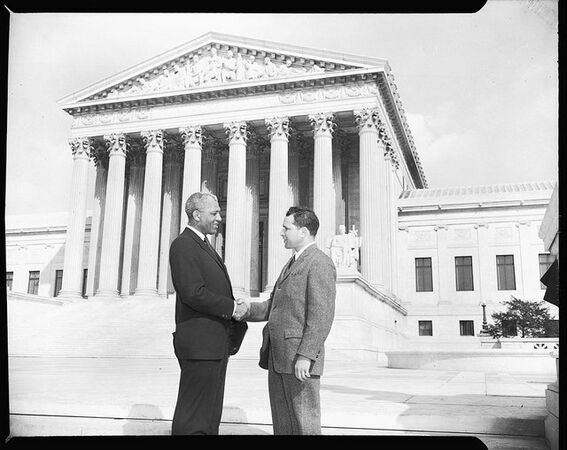Seven County Infrastructure Coalition v. Eagle County, Colorado
 | |
| Seven County Infrastructure Coalition v. Eagle County, Colorado | |
| Docket number: 23-975 | |
| Term: 2024 | |
| Court: United States Supreme Court | |
| Important dates | |
| Argued: December 10, 2024 | |
| Court membership | |
| Chief Justice John Roberts • Clarence Thomas • Samuel Alito • Sonia Sotomayor • Elena Kagan • Neil Gorsuch • Brett Kavanaugh • Amy Coney Barrett • Ketanji Brown Jackson | |
Seven County Infrastructure Coalition v. Eagle County, Colorado is a United States Supreme Court case concerning whether agencies are required to assess environmental impacts beyond the scope of their regulatory authority. The case was argued on December 10, 2024, during the court's October 2024-2025 term.
The case came on a writ of certiorari to the United States Court of Appeals for the District of Columbia Circuit. To review the lower court's opinion, click here.
Why it matters: The case could clarify the scope of agency regulatory impact analyses. The case also has the potential to clarify the requirements of the National Environmental Policy Act in relation to agency requirements to study environmental impacts outside the scope of their regulatory authority.
Timeline
The following timeline details key events in this case:
- December 10, 2024: The U.S. Supreme Court heard oral argument.
- June 24, 2024: The U.S. Supreme Court agreed to hear the case.
- March 4, 2024: Seven County Infrastructure Coalition, et al. appealed to the U.S. Supreme Court.
- August 18, 2023: The United States Court of Appeals for the District of Columbia Circuit partially denied and partially granted the petitions, and partially vacated the final exemption order. The court also vacated the environmental impact statement and the biological opinion, and remanded the case for further proceedings.
Background
| Administrative State |
|---|
| Five Pillars of the Administrative State |
| • Judicial deference • Nondelegation • Executive control • Procedural rights • Agency dynamics |
| Click here for more coverage of the administrative state on Ballotpedia |
The Seven County Infrastructure Coalition petitioned the Surface Transportation Board (STB) in 2020 to begin construction of a new rail line in Utah, in which the “predominant and expected primary purpose would be the transport of waxy crude oil produced in the Uinta Basin.” The board was required to complete an environmental impact statement pursuant to the National Environmental Policy Act (NEPA) highlighting the environmental impacts associated with the new rail line before granting approval.[2]
Eagle County, Colorado, and a group of environmental organizations challenged the board’s decision to approve the construction of the rail line, arguing that the STB did not complete an adequate environmental review as directed by NEPA. They argued that the board should have considered the environmental impacts of the proposed rail line extracting crude oil.
The United States Court of Appeals for the District of Columbia Circuit ruled in favor of the group, arguing that the STB “cannot avoid its responsibility under NEPA to identify and describe the environmental effects of increased oil drilling and refining on the ground that it lacks authority to prevent, control, or mitigate those developments.”[2]
The decision was appealed to the U.S. Supreme Court which agreed to hear the case during the October 2024-2025 term.[3]
Case summary
The following are the parties to this case:[4]
- Petitioner: Seven County Infrastructure Coalition, et al.
- Legal counsel: Jay Christopher Johnson (Venable LLP)
- Respondent: Eagle County, Colorado, et al.
- Legal counsel: Nathaniel Hemmerick Hunt (Kaplan Kirsch & Rockwell LLP), Elizabeth B. Prelogar (United States Solicitor General), Edward Breckenridge Zukoski (Center for Biological Diversity)
The following summary of the case was published by SCOTUSblog:[5]
| “ | In Seven County Infrastructure v. Eagle County, Colo., the court agreed to decide whether the National Environmental Policy Act, which requires federal agencies to examine the environmental effects of proposed actions by the federal government and inform the public of the environmental issues that it considered when making its decisions, requires an agency to study environmental impacts beyond the immediate effects of the action that the agency has authority to regulate. The question comes to the court in a challenge to the scope of an environmental review by the Surface Transportation Board of a new rail line in Utah.[6] | ” |
To learn more about this case, see the following:
- U.S. Supreme Court docket file
- Oyez case file
- SCOTUSblog case file
- Cornell Law School Legal Information Institute
Questions presented
The petitioner presented the following questions to the court:[1]
Questions presented:
|
Oral argument
Audio
Audio of oral argument:[7]
Transcript
Transcript of oral argument:[8]
Outcome
The case is pending adjudication before the U.S. Supreme Court.
October term 2024-2025
The Supreme Court began hearing cases for the term on October 7, 2024. The court's yearly term begins on the first Monday in October and lasts until the first Monday in October the following year. The court generally releases the majority of its decisions in mid-June.[9]
See also
External links
- Search Google News for this topic
- U.S. Supreme Court docket file - Seven County Infrastructure Coalition v. Eagle County, Colorado (petitions, motions, briefs, opinions, and attorneys)
- SCOTUSblog case file for Seven County Infrastructure Coalition v. Eagle County, Colorado
- National Environmental Policy Act
Footnotes
- ↑ 1.0 1.1 U.S. Supreme Court, "23-975 SEVEN COUNTY COALITION V. EAGLE COUNTY COLORADO," June 24, 2024
- ↑ 2.0 2.1 CaseText, "Eagle Cnty. v. Surface Transp. Bd.," August 18, 2023
- ↑ SCOTUSblog, "Nine new relists as the court approaches the finish line," June 20, 2024
- ↑ U.S. Supreme Court, "23-975 - Seven County Infrastructure Coalition v. Eagle County, Colorado," accessed July 12, 2024
- ↑ SCOTUSblog, "Court adds seven cases to next term’s docket," June 24, 2024
- ↑ 6.0 6.1 Note: This text is quoted verbatim from the original source. Any inconsistencies are attributable to the original source.
- ↑ Supreme Court of the United States, "Oral Argument - Audio," argued December 10, 2024
- ↑ Supreme Court of the United States, "Oral Argument - Transcript," argued December 10, 2024
- ↑ SupremeCourt.gov, "The Supreme Court at Work: The Term and Caseload," accessed January 24, 2022
| ||||||||||||||||||||||||||||
| |||||||||||
| |||||||||||




